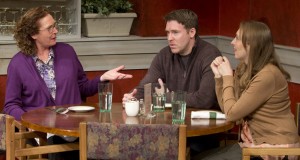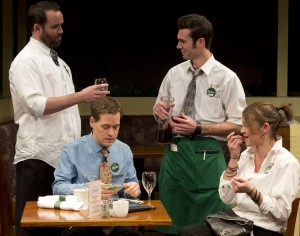Low-wage workplaces in two towns separated by a river provide the backdrop for Lewiston/Clarkston, two 90-minute dramas separated by a meal break. Playwright Samuel D. Hunter peppers these compelling plays with characters who are descendants of 19th-century explorers Meriwether Lewis and William Clark. But their reasons for traveling, or staking territorial claims, have more to do with personal setbacks and family tragedy than with discovery or affirmation. If Lewis and Clark were dispatched westward by Thomas Jefferson, these beaten-down distant relatives, making their way through a drug-addled world of subdivisions and superstores, seem as if they were sent on the road by Jack Kerouac.
Chris (Edmund Donovan) and Heidi Armbruster as his mother, Trisha. Top: Arnie Burton plays Connor, the platonic roommate of Kristin Griffith’s Alice, in Lewiston, the first half of Samuel D. Hunter’s linked plays, Lewiston/Clarkston.
Lewiston, the more intriguing of the two works, is set at a fireworks stand off a rural highway in Lewiston, Idaho. Alice (Kristin Griffith), a sturdy and stoic septuagenarian, runs the place while holding tight to the 20 acres of family land that have yet to be overrun by new construction. Alice’s helper, platonic roommate and voice of reason is Connor (Arnie Burton), a former butcher who just wishes that Alice would sell off her property so they could go live in a nice condo with a swimming pool. Hunter keenly shows the pair to be stuck in an unnatural stasis. Field mice, shaken by the shrinking fields, have taken to gnawing through the stand’s inventory to eat the gunpowder, while the only fireworks Alice can legally sell are those that stay tethered to the ground. “Fountains, sparklers, smoke bombs, little rolly things. Not much else.” But then Alice’s 24-year-old granddaughter, Marnie (Leah Karpel), comes to call, providing the spark that will blow up their unstable calm.
It is Marnie’s first visit since she was a child, and although she arrives with just a backpack, she brings no shortage of emotional baggage. She and Alice are both haunted by Marnie’s mother, who arrives as a disenfranchised voice on a collection of cassette tapes that Marnie has inherited. Marnie’s connection to the land, meanwhile, is full of ironies. Her childhood home is now a gas station. She has built, and abandoned, an urban farm in Seattle. The very concept of urban farming sounds crazy to Connor, but not as crazy as her vegetarian lifestyle. “Oh well lah dee dah, look who’s too good for the food chain,” he says mockingly. All three characters get under one another’s skin as they weigh the importance of holding on to the past against the sacrifices of letting it go. Precise, charismatic performances from Griffith and Burton, as survivors who have had to swallow a lot over their lifetimes stand in juxtaposition to Karpel’s sensitive work as a woman whose own problems are just beginning. Under the fine direction of Davis McCallum, the trio brings a perfect tension to the proceedings.
“If Lewis and Clark were dispatched westward by Thomas Jefferson, these beaten-down distant relatives, making their way through a drug-addled world of subdivisions and superstores, seem as if they were sent on the road by Jack Kerouac.”
Where Lewiston is about finding home, Clarkston is about fleeing it. Where Lewiston slowly peels back layers of story to reveal harsh realities, Clarkston tears open its wounds and lets them seep. The action, this time, takes place in Clarkston, Wash., under the cold, fluorescent lights of a Costco, that great American icon of overabundance amid poverty, with its shelves full of 80-inch televisions and giant tubs of cheese puffs.
Two night-shift workers, Chris and Jake (Edmund Donovan and Noah Robbins), are getting to know each other. There are commonalities. They are both in their early 20s, both have fled their families, and both are gay. But the tensions lie in their differences. Chris is outwardly rugged yet sensitive enough to want to be a writer. He has been living on his own for six months, needing to escape his mother, Trisha (Heidi Armbruster) and her struggles with drug addiction. Jake is scrawny and sickly, carrying a disease that he is sure will kill him before he turns 30. He has escaped his apparently caring and well-to-do family in Connecticut, because it is the only thing in his life that he can escape. Chris plans for the future while Jake sulks: “It’s a terrible time to be alive. There’s just nothing left to discover.”
Noah Robbins, foreground, as Jake, and Donovan as Chris in Clarkston. Photographs by Jeremy Daniel.
Gut punches come hard and fast to Chris. His dream is crushed, his mother falters, and he learns a hard truth about his absent father. Jake provides little solace as they attempt to become more than just friends. He considers suicide in front of Chris one moment and further aggravates Chris and Trisha’s broken relationship the next.
Hunter is perhaps counting on Jake’s sickness to make him a sympathetic character, but despite (or perhaps because of) a performance from Robbins that captures all of Jake’s irritating qualities, he is difficult to like. Chris is in need of comforting, but it is hard to buy the attraction he feels. We are left wanting more interaction between Donovan and Armbruster, who are no less than captivating in the scenes that they do have together. Hunter is also too carefree, at times, in his setups. We learn, early on, that Jake tends to drop things and that neither man has ever been to the Pacific Ocean, so we know it is only a matter of time before Jake indeed drops something important and the two make a beeline for the coast.
McCallum and his production team keep things intimate, staging the plays for an audience of 51 in what was formerly the house of the Rattlestick Playwrights Theater. Folding chairs on a carpeted playing area have replaced the battered old installed seating, and communal tables come out between plays, allowing the audience to compare appetites while contrasting the West Village to the West.
Lewiston/Clarkston is playing through Dec. 16 at the Rattlestick Playwrights Theater (224 Waverly Place). Evening performances are at 7 p.m. Monday and Wednesday through Saturday; matinees are at 3 p.m. Sunday, with special Friday matinees at 1 p.m. on Nov. 9, 16, and 30. For tickets and information, visit rattlestick.org.











